Hunter was diagnosed with acute lymphoblastic leukemia when he was two-and-a-half years old. He had four years of treatment, and he is now in remission. He has been featured as a SickKids Foundation Ambassador and featured in their 2016 campaign.
His mother, Sitara, became actively involved with SickKids and is now the co-chair of the SickKids Family Advisory Council.
Sitara: It was a surreal night in emerg when Hunter was diagnosed. It’s not like in the movies where you go home, call up your friend and pour a snifter of brandy. I just remember we were told that we weren’t going home; they were like, “We’re starting treatment right away.” They whisked him onto this fast moving train and it was up to us to jump on and figure it out.
Everyone was basically speaking a foreign language—I remember with the acronyms, I was like, what are they saying? As a family member you have to learn the drugs and the acronyms of the tests because it’s easier for you in the long run. But that first week or two—it was completely overwhelming.
And then there were all of these professionals coming in. My husband was like, “I just want to lock the door.” Hunter’s room was supposed to be our safe space and everyone was just coming in—no one just walks through your house like that!
Initially, I had called in sick to work as if I had a cold. It still felt private, and I didn’t really understand it, even saying “leukemia” out loud made no sense to me. That first month—denial, and then after the first 30 days I knew it was going to be a very long road.
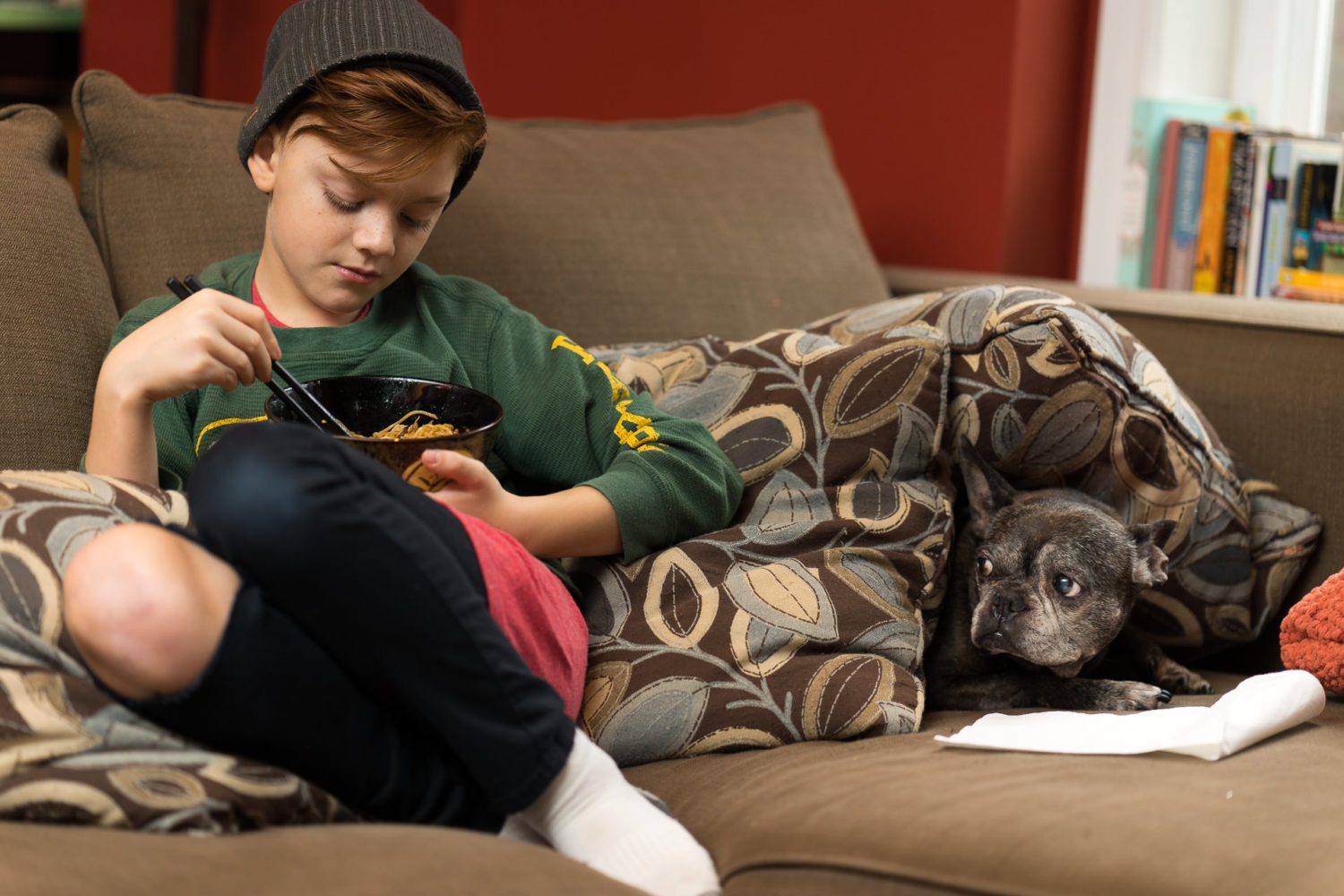
Hunter: My mom would tell me everything. Some parents don’t because they are worried it will make their kids more scared, or they are actually scared themselves.
I just like knowing what’s going on, even when they are giving me needles and stuff. They always said, “Close your eyes and count to three,” but I never liked doing that, I actually stared because I wanted to know.
Sitara: Hunter used to say that it was scarier to not know because then your imagination makes things up. Sometimes what you make up is scarier than what’s actually going to happen. He didn’t like to be distracted, he wanted to be supported.
He gets really mad when parents or clinicians say, “This won’t hurt,” or “It will just take a second.” And then it does hurt and it doesn’t just take a second. Then you just don’t trust them at all. It’s better to say, “This is going to hurt, but it will go away in a few minutes. It won’t be the worst thing you’ve felt.”
I just remember we were told that we weren’t going home; they were like, “We’re starting treatment right away.”
Hunter: A nurse came to my school to talk about my disease with my classmates.
Sitara: They do age-appropriate information sessions for the child’s peers as well as siblings. Because Hunter had an NG tube for almost 19 months, they would explain why, and what the purpose of it was, and field some of those questions.
Hunter: That helped because then I didn’t have to explain it. A lot of the time my classmates didn’t believe me. Some people don’t really get it unless you have no hair, needles sticking out and an IV. They have to see you in a wheelchair or something. Like now I have chronic pain that’s really bad, but since they can’t see it, they don’t think it’s that bad.
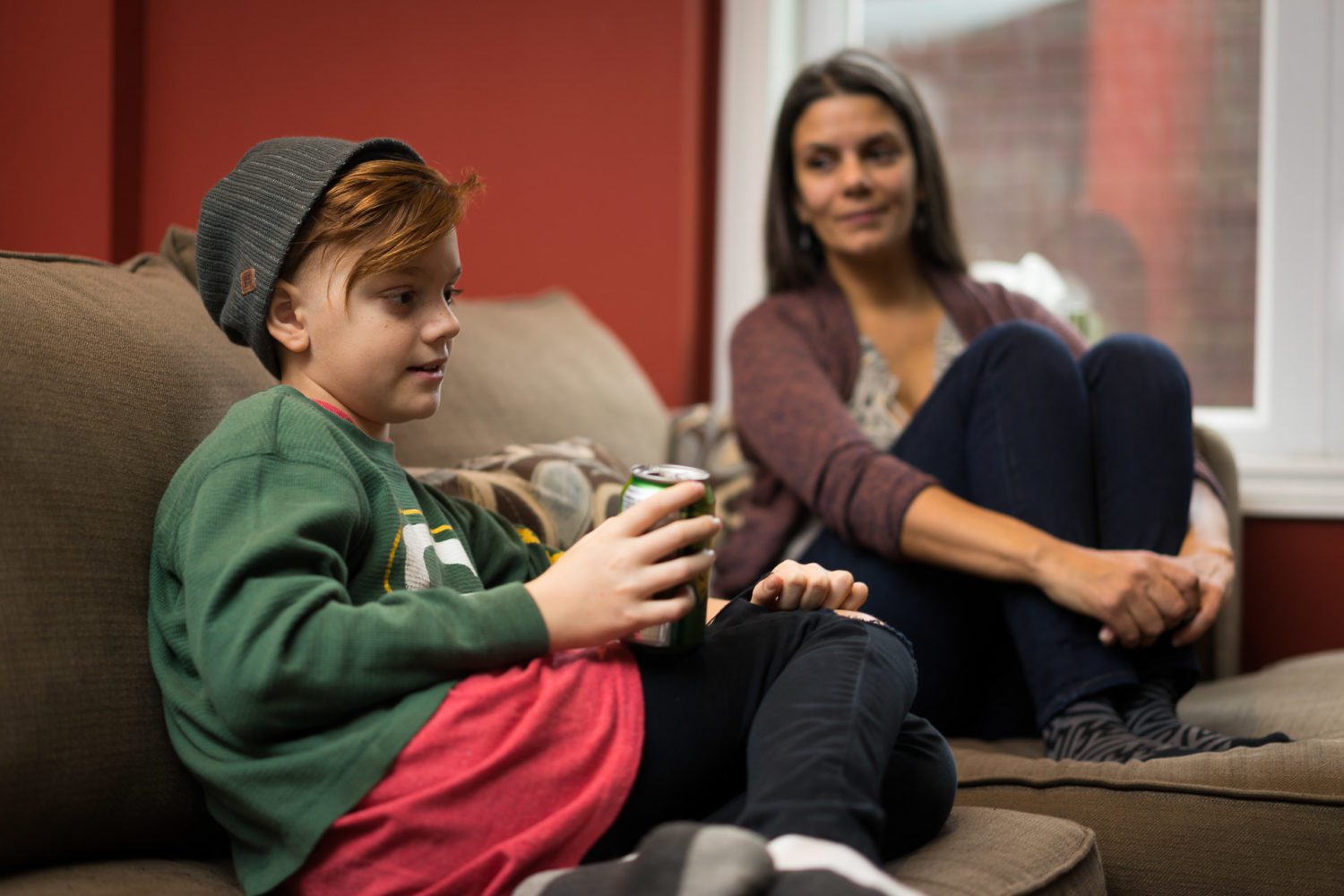
Sitara: Another impact of cancer is that when you’re in hospital you make friends with fellow cancer patients. There are many different cancers out there and not every childhood cancer has the survival rate that Hunter’s has.
Being involved with the hospital’s foundation gives us a community. We spent a lot of time just by ourselves with Kung Fu Panda on the TV! A lot of regular real-world connections had to be put on pause or they just dissolved away. We have made some really nice friends doing the foundation work. And Hunter has become quite passionate about giving back and raising awareness about kids who are sick.
Hunter: I just want to give back to the hospital because they saved my life. Cancer is definitely not good at all, but because of it I am probably a better person today. I think I am probably a lot nicer now; a lot of people in my school have diabetes and their own troubles, so I think I can be more understanding, like more empathetic.
But two years ago we were writing about our worst days ever, and I got really upset because one of the kid’s worst days ever was when he didn’t get a toy he wanted. Even for a kid who has the best life ever, that’s not even bad!
Sitara: It’s hard, sometimes, to fit into a regular 11-year-old world when you have had a lot of life and death perspective.
Sitara: Sometimes I didn’t cope. There’s that expression “You take it one day at a time,” but honestly, sometimes it was five minutes at a time. Because it’s so ongoing, you don’t have the downtime to really process. You’re busy looking after your child. I remember how frightening it was: All of a sudden there were all of these meds and drugs… By the end, I was doing his butterfly changes; I could do his NG tube changes.
Hunter: You went from changing diapers to changing IVs!
Sitara: I wish I had taken more pictures to chronicle some of the journey. It seems so counterintuitive, but in part because he was so young and I wish we had captured that and then also it’s just sort of a normal thing to do: That was our family time. The first time Willow [Hunter’s younger sister] rolled over was in the hospital. We weren’t going to a preschool play group, we weren’t going to mom drop-ins, we weren’t going to the park, we weren’t going to the library, we didn’t go to the mall Santa. All of our activities, our firsts, our family time, centred around being in the hospital.
I wish I had had the opportunity to connect with other families, or that I had understood the value of that. The inclination is to shelter and lock down your family which is an important intuitive thing to do, to bring everyone in under your wing and just guard your family. But I think peer support is so important when families go through a difficult diagnosis or chronic illness. You need someone else who has walked a similar path.
My mom would tell me everything. Some parents don’t because they are worried it will make their kids more scared, or they are actually scared themselves.
Sitara: Hunter’s doctor was really phenomenal—he set the stage for empowering both of us. There aren’t many children who would say “no” to a fellow who walks in the room to examine him. But Hunter felt empowered because of the way his doctor had treated him like a real person and gave him the skills and permission to speak up. Similarly, I was empowered to ask questions until I understood, and to ask the same question over and over again.
We were just at the pain clinic and we were talking about a new medicine that Hunter is going to take. The doctor was saying to me, “You’ll do this and that,” and Hunter went, “Well, actually, I am the one who is taking the pill.” And she said, “Yes, you are. I am sorry.”
Hunter: But not every kid is going to say that.
Sitara: Not every kid is going to say that, and not every doctor would even provide an apology. I think it’s really challenging because not every child is able to be, or wants to be, as informed or active as much as Hunter does. But recognizing that spectrum is important.
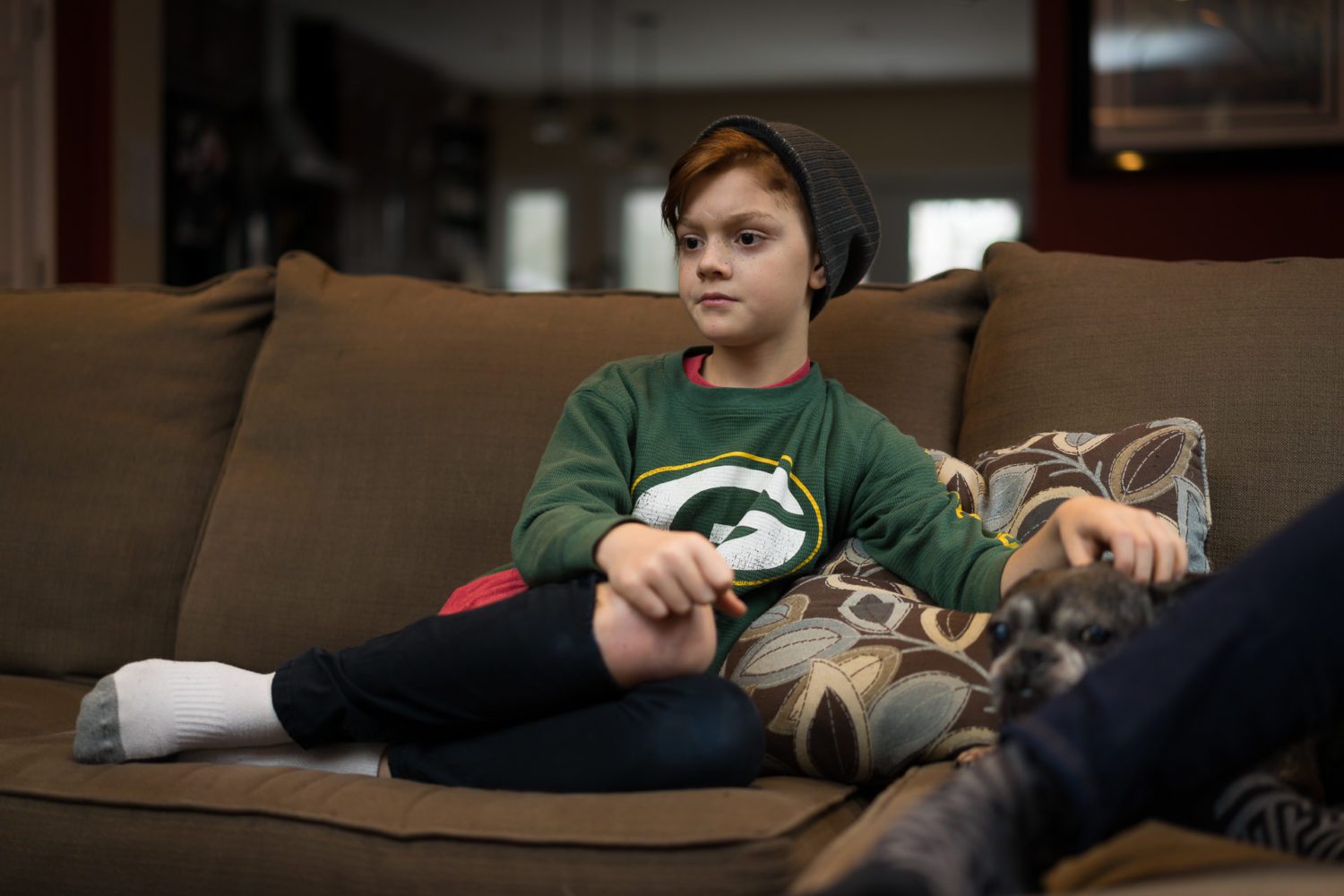
Sitara: I became pregnant while Hunter was still technology-dependent and receiving chemo. I kept missing my prenatal appointments because he was so sick. Someone referred me to the midwives collective and they came to SickKids and did my prenatal stuff there.
We had about 12 different birth plans. Like, if we’re at home and dad’s at work and Josh [Hunter’s older brother] is at school, this is the plan. But if Josh is at home and dad is at work, this is the plan. Because there were so many different scenarios, we had to plan for the worst. We had to have Josh psychologically assessed because Hunter was technology-dependent so if something happened, we couldn’t just get friends in or a babysitter. So Josh had to be able to tube feed and check the placement of the NG so Hunter wouldn’t fill up his lungs with fluid. He had to have full consent-signing authority for any treatments that could suddenly arise. That’s a lot of pressure and responsibility on a 16-year-old!
In the end, Willow was born on the Family Day long weekend and we were all at home, which was the best-case scenario.
We were just at the pain clinic and we were talking about a new medicine that Hunter is going to take. The doctor was saying to me, “You’ll do this and that,” and Hunter went, “Well, actually, I am the one who is taking the pill.” And she said, “Yes, you are. I am sorry.”
Sitara: I think doctors should do some volunteer work in a respite capacity.
Hunter: Yeah, so they could actually see what the kids go through because they only come in every once in a while.
Sitara: I think for nurses too. Obviously they’re a little bit more hands on.
Going from pediatrics to adult is like night and day. I think some adult settings could learn a little from the pediatric setting about empathy and compassion. I think one of the things that’s really frightening for kids is moving into the adult system.
A lot of people say you’re just like a number, which isn’t true. There are some wonderful adult practitioners. But it’s really different. I think any chance you have to become more compassionate or empathetic, you should [take it]. It may just be a day at work for you, but you’re seeing families when they’re at their worst, most stressed and vulnerable. Health care providers can walk out of the hospital and go “Wow, that was a really hard day,” but kids and families don’t ever walk out of it. That’s a really important thing for people to know.
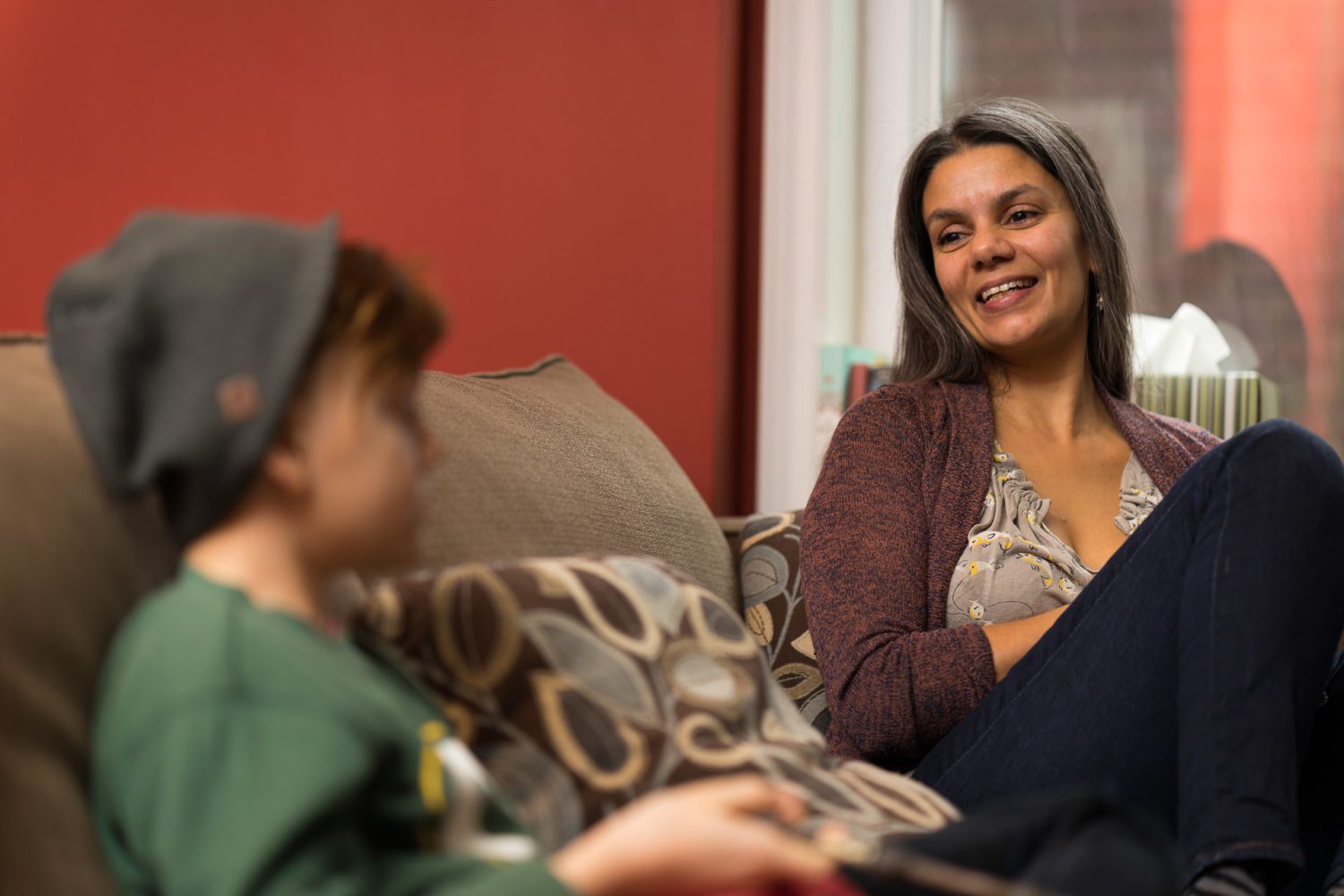

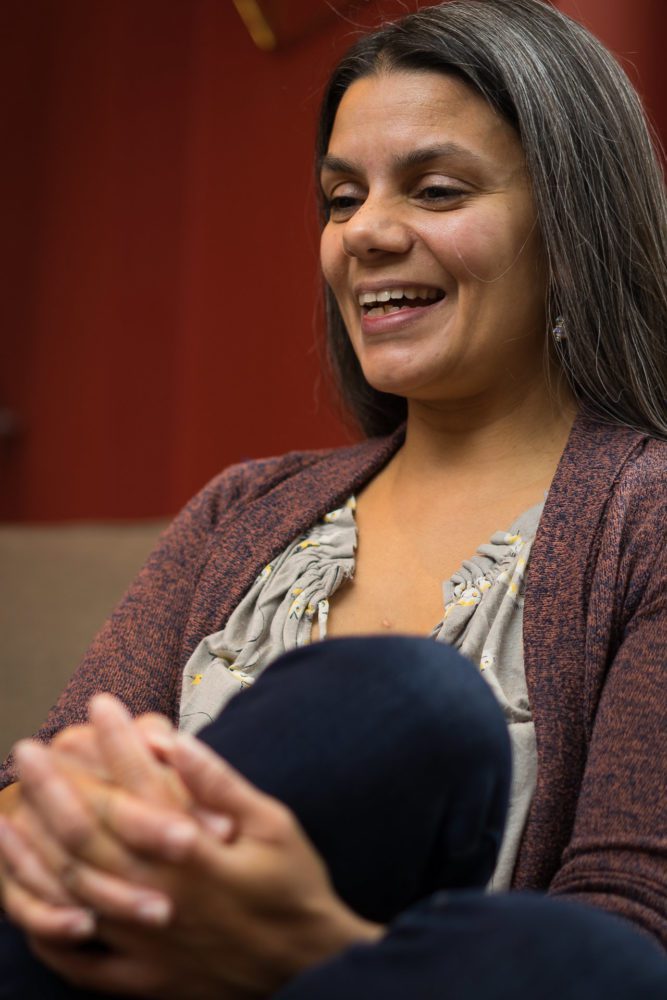

The comments section is closed.